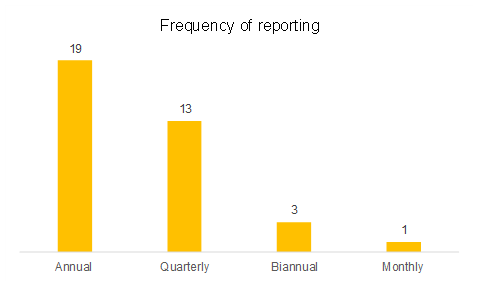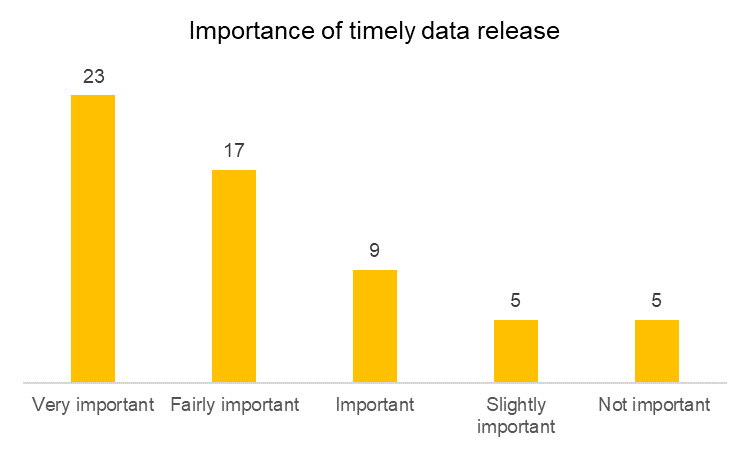Consultation response
Participation and prevalence research
From December 2020 to February 2021 we consulted on the proposals to change how we collect adult gambling participation and problem gambling prevalence statistics.
Contents
- Executive summary - participation and prevalence research
- Introduction - participation and prevalence research
- Summary of responses - participation and prevalence research
- Introduction to summary of responses
- Proposal 1: Single survey for Great Britain
- Proposal 2: Consolidation of current surveys
- Proposal 3: Participation questions
- Proposal 4: Frequency and turnaround time
- Proposal 5: Explore more future proof methods
- Proposal 6: Survey pilot
- Annex A: List of consultation responses
Proposal 4: Frequency and turnaround time
Issue:
The infrequency and long turnaround time of the Health Surveys from inception to reporting.
Proposal:
To explore surveys (including existing external surveys) which we would be able to access more frequently than the Health Surveys and which have a shorter turnaround time. To move towards at least annual publication of participation and prevalence metrics.
Consultation questions
- Q11. Do you agree with this proposal?
- Q12. What is an appropriate frequency for reporting?
- Q13. How important is it to release data more quickly after its collection and do you have any views on what sort of timescales would be acceptable or preferable?
Respondents’ views
The majority of respondents agreed with the proposal to explore more timely survey options, although respondents had a stronger tendency to agree (28 respondents) rather than strongly agree (14 respondents). 10 respondents neither agreed nor disagreed with the proposal and 10 respondents disagreed (5 disagree and 5 strongly disagree).
More timely access to surveys and results was desirable amongst respondents, with a regular annual publication seen as a good idea which would keep up with the pace of change and make sure policy decisions are based on up to date evidence. One respondent from a trade association thought it would be good if the publication of the data could align with the financial year to help with business planning.
Respondents were however keen to understand the practical benefits the Commission hopes to get from faster reporting, querying what issues the current time lag presents and what policy decisions the Commission thinks might have been taken or done differently with more up to date information, especially given that gambling behaviours appear to change at a modest rate.
Respondents were also keen to stress that whilst a faster turnaround time sounds good, it should not be at the expense of robustness or comparability. If, however we were able to maintain an appropriately robust methodology and reduce the time lag between data collection and publication, this would be welcomed and would meet best practice standards for official statistics.
One of the issues highlighted in the consultation document was that survey content cannot be adapted quickly to reflect new gambling behaviours and whilst respondents thought that a bespoke survey would provide the flexibility to make survey design changes, others were concerned about comparability of trends over time if questions were constantly changing. A modular approach to questionnaire design, whereby pressing policy issues could be explored through ad hoc questions added on a modular basis, would however be advantageous.
One respondent asked if options to speed up access to the Health Survey data had been explored fully. Another commented on an increasing move in health research to develop swifter and more flexible approaches including continuous research which have been accelerated by the coronavirus (COVID-19) pandemic. Examples include the Better Health Programme Wider Impacts of coronavirus (opens in new tab).
When asked how often it would be appropriate to report gambling participation and prevalence data, most respondents were satisfied with annual reporting or as in the example given in the consultation document, annual reporting with shorter quarterly updates.
Figure 4: Frequency of reporting
Base: 36 responses

Data for chart
| Annual | Quarterly | Biannual | Monthly | |
|---|---|---|---|---|
| Number of responses | 19 | 13 | 3 | 1 |
Most respondents thought it was important to release data on gambling participation and prevalence of problem gambling quickly after its collection, 23 respondents said it was very important and 17 said it was fairly important. However, respondents were also keen to stress that the quick turnaround of the data needs to be balanced alongside the need for rigour and statistical accuracy. There was also a suggestion to build in time to peer review any publication.
Figure 5: Importance of releasing data more quickly after collection
Base: 59 responses

Data for chart
| Very important | Fairly important | Important | Slightly important | Not important | |
|---|---|---|---|---|---|
| Number of responses | 23 | 17 | 9 | 5 | 5 |
Our position
We will seek to establish a survey which enables us to publish participation and prevalence statistics on at least an annual basis and quarterly if possible, whilst ensuring this more frequent publication does not impact the robustness or the accuracy of the research.
We will also consider the timing of the publication, possibly to align with the financial year.
As part of our commitment to refresh the gambling activities included with the participation question in the survey, we will also establish a set of core participation and prevalence metrics which are asked on every wave of the research alongside a modular design for other topic areas which can be asked on a less frequent basis.
We will explore examples of continuous research in health research.
We will seek advice on a periodic external peer review process for publication.
Proposal 3: Participation questions Next section
Proposal 5: Explore more future proof methods
Last updated: 31 October 2024
Show updates to this content
Formatting changes only.
